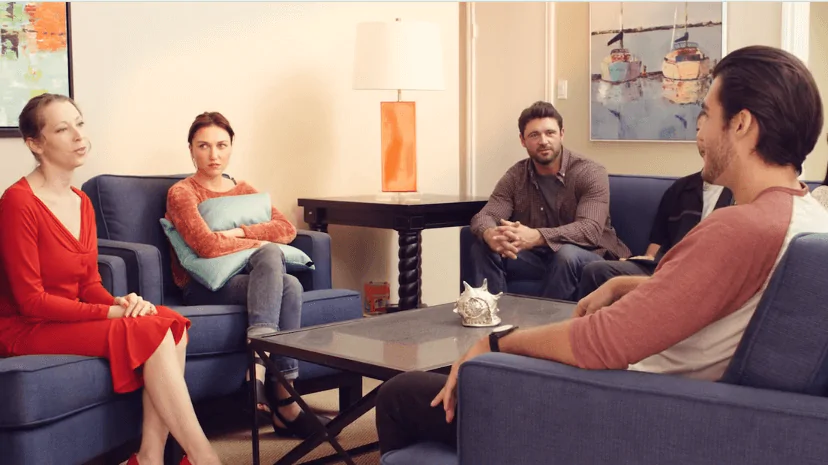24/7 Helpline:
(866) 899-221924/7 Helpline:
(866) 899-2219
Learn more about OCD Treatment centers in Buellton
OCD Treatment in Other Cities

Other Insurance Options

Molina Healthcare

ComPsych

Regence

Choice Care Network

EmblemHealth

GEHA

BHS | Behavioral Health Systems

Anthem

Providence

Amerigroup

Holman Group

PHCS Network

Health Choice
Beacon

Horizon Healthcare Service

CareSource

Access to Recovery (ATR) Voucher

Premera

BlueCross

Carleon










Santa Barbara Cottage Hospital – Detox Program
Santa Barbara Cottage Hospital is a dual diagnosis facility based in Santa Barbara, California. The ...

Elements Counseling Group
Elements Counseling Group is a non-profit rehab located in Santa Maria, CA. Elements Counseling Grou...

CADA – North County Programs
CADA - North County Programs offers outpatient treatment for individuals with alcohol and/or substan...

Good Samaritan Services – Another Road Detox
Good Samaritan Services – Another Road Detox is a drug and alcohol rehab center in Lompoc, Californi...

Sanctuary Centers
Sanctuary Centers of Santa Barbara is a non-profit rehab located in Santa Barbara, CA. Sanctuary Cen...

Santa Barbara Cottage Hospital – Behavioral Health
Santa Barbara Cottage Hospital - Behavioral Health offers inpatient and outpatient services for indi...

Coast Valley
Coast Valley is a drug and alcohol treatment center that supports adults with substance use disorder...

Santa Ynez Tribal Health Clinic – Behavioral Health Services
Santa Ynez Tribal Health Clinic – Behavioral Health Services is a public rehab located in Santa Ynez...

Coast Valley – F Street
Coast Valley - F Street is an out-patient program offering a variety of counseling and drug testing ...

Santa Barbara Rescue Mission
The Santa Barbara Rescue Mission's Men's Residential Treatment Program is a 12-month, faith-centered...

AEGIS Treatment Centers – Santa Maria
AEGIS Treatment Centers - Santa Maria is an outpatient rehab located in Santa Maria, CA. AEGIS Treat...

All Star Recovery
All Star Recovery is a Sober Living facility for men that are in a recovery process from a Chemical ...

New House
New House is a structured recovery residence for men, located in Santa Barbara, California. The prog...

Good Samaritan Services – Turning Point
Good Samaritan Services – Turning Point is a non-profit rehab located in Lompoc, California. Good Sa...

Santa Maria Valley Youth and Family Center
Santa Maria Valley Youth and Family Center is a non-profit rehab located in Santa Maria, California....

Cottage Outpatient Center of San Luis Obispo
Cottage Outpatient Center of San Luis Obispo is a private rehab located in Santa Barbara, California...

New House III
Located in Santa Barbara, California, New House III is a drug and alcohol rehab that supports adult ...

Changes Outpatient Wellness Center
Changes Outpatient Wellness Center offers inpatient and outpatient services for individuals with alc...

Good Samaritan Services
Good Samaritan Services - North N. Street offers inpatient detox services for individuals recovering...

The Giving Tree Sober Living Homes for Women
The Giving Tree Sober Living Homes for Women is a sober living home for women in recovery from alcoh...

Full Spectrum Recovery & Counseling
Full Spectrum Recovery & Counseling is an outpatient treatment dedicated to provide services for sub...

Acacia Counseling Wellness
Acacia Counseling Wellness is a private rehab located in Goleta, California. Acacia Counseling Welln...

Central Coast Rescue Mission – Men’s Recovery Program
Central Coast Rescue Mission - Men's Recovery Program is a non-profit organization located in Santa ...

Acacia Counseling Wellness Isla Vista
Acacia Counseling Wellness Isla Vista is a private rehab located in Goleta, California. Acacia Couns...

Adult Mental Health Services
Adult Mental Health Services is a private rehab located in Santa Barbara, California. Adult Mental H...

Alsana
Alsana is a private rehab located in Santa Barbara, California. Alsana specializes in the treatment ...

Salvation Army Transition and Recovery Center
Salvation Army Transition and Recovery Center is a non-profit rehab located in Santa Barbara, Califo...

Zona Seca
Zona Seca is a private rehab located in Santa Barbara, California. Zona Seca specializes in the trea...

Daniel Bryant Youth and Family Center
Daniel Bryant Youth and Family Center offers outpatient treatment for individuals with alcohol and/o...

Good Samaritan Shelter – Recovery Point
Good Samaritan Shelter - Recovery Point offers outpatient treatment for individuals with alcohol and...

Coast Valley – H Street
Coast Valley - H Street is an out-patient program offering a variety of counseling and drug testing ...

The Champion Center
The Champion Center offers inpatient and outpatient treatment for individuals with alcohol and/or su...

















AA – Alcoholics Anonymous
AA – Alcoholics Anonymous is a non-profit rehab located in Goleta, California. AA – Alcoholics Anony...

Alan Counseling
Alan Counseling is a private rehab located in Santa Barbara, California. Alan Counseling specializes...

AA – Alcoholicos Anonimos – Ultima Llamada
AA – Alcoholicos Anonimos – Ultima Llamada is a non-profit rehab located in Santa Barbara, Californi...

New Vistas Treatment Program
New Vistas Treatment Program is a private rehab located in Santa Barbara, California. New Vistas Tre...

Right Detour
Right Detour is a private rehab located in Santa Maria, California. Right Detour specializes in the ...

A Spiritual Abode
A Spiritual Abode is a private rehab located in Santa Maria, California. A Spiritual Abode specializ...

Casa Serena – Castillo Street
Casa Serena – Castillo Street is a non-profit rehab located in Santa Barbara, California. Casa Seren...

Pacific Pride Foundation
Pacific Pride Foundation is a private rehab located in Santa Barbara, California. Pacific Pride Foun...

Santa Maria Center for Change
Santa Maria Center for Change is a non-profit rehab located in Santa Maria, California. Santa Maria ...

Central Coast Headway
Central Coast Headway is a private rehab located in Lompoc, California. Central Coast Headway specia...

AA – Alcoholics Anonymous – Northern Santa Barbara County Central Office
Alcoholics Anonymous (AA) - Northern Santa Barbara County Central Office is a service office of Alco...

Alano Club
Alano Club is a non-profit rehab located in Santa Barbara, California. Alano Club specializes in the...

Al – Anon Family Group
Al – Anon Family Group is a non-profit rehab located in Santa Barbara, California. Al – Anon Family ...

Council on Alcoholism and Drug Abuse – Adult Outpatient Treatment
Council on Alcoholism and Drug Abuse - Adult Outpatient Treatment offers outpatient treatment for in...

Phoenix of Santa Barbara
Phoenix of Santa Barbara is a private rehab located in Santa Barbara, California. Phoenix of Santa B...

AA – Alcoholics Anonymous – Central Office
AA – Alcoholics Anonymous – Central Office is a non-profit rehab located in Santa Barbara, Californi...

Family Services – Alcohol and Drug Counseling
Family Services – Alcohol and Drug Counseling is a private rehab located in Lompoc, California. Fami...

Casa Serena Treatment Programs for Women
Casa Serena is a residential program in Santa Barbara for women struggling with addiction. The Missi...

Council on Alcoholism and Drug Abuse – Recovery Detox
Council on Alcoholism and Drug Abuse – Recovery Detox is a private rehab located in Santa Barbara, C...

SOS Sober Living for Women
SOS Sober Living for Women is a private rehab located in Santa Barbara, California. SOS Sober Living...

Central Coast Headway – Drug and Alcohol
Central Coast Headway – Drug and Alcohol is a private rehab located in Santa Maria, California. Cent...

Alano Club
Alano Club is a non-profit rehab located in Lompoc, California. Alano Club specializes in the treatm...

Council on Alcoholism and Drug Abuse
Council on Alcoholism and Drug Abuse is a private rehab located in Santa Barbara, CA. Council on Alc...

Monarch Recovery
Monarch Recovery is a private rehab located in Santa Barbara, California. Monarch Recovery specializ...

Santa Barbara Rescue Mission – Bethel House
Santa Barbara Rescue Mission – Bethel House is a drug and alcohol rehab that supports women with sub...

La Ventana Treatment Programs
La Ventana Treatment Programs - East Arrellaga Street offers intensive outpatient programs for indiv...

Devereux Advanced Behavioral Health – California
Devereux Advanced Behavioral Health - California offers a full continuum of programs and services in...

Reset Summer Camp – Digital Detox
Reset Summer Camp – Digital Detox is a private rehab located in Santa Barbara, California. Reset Sum...

Santa Barbara County Child and Family Mental Health
Santa Barbara County Child and Family Mental Health is a public rehab located in Santa Barbara, Cali...

Zona Seca Youth and Family Treatment Center
Zona Seca Youth and Family Treatment Center is a private rehab located in Lompoc, California. Zona S...

Casa Serena – Oliver Road
Casa Serena – Oliver Road is a non-profit rehab located in Santa Barbara, California. Casa Serena – ...

ADAPT and Recovery
ADAPT and Recovery is a private rehab located in Los Alamos, New Mexico. ADAPT and Recovery speciali...

Los Alamos Family Council
Los Alamos Family Council is a non-profit rehab located in Los Alamos, New Mexico. Los Alamos Family...



























































































